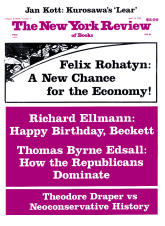Ferdinand Marcos ornamented the days preliminary to his retirement from the active practice of political science with a number of observations that suggest powers of analysis undiminished by the erosions of office. He was at his cogent best when it came to assessing Corazon Aquino’s inadequacies for picking up the golden chains that had been so long and so tirelessly dragged along by himself and his loved ones.
“What does she know of governing?” he is said to have asked. “Does she know how to fight the communists or how to get a loan from the International Monetary Fund?”
He had isolated the two prime requisites of public management for equipping any developing—or, as in his case, unraveling—nation for the favors the United States reserves for trustworthy allies.
The refinements of Marcos’s philosophy of government are now in process of being richly annotated in the ledgers piled up in the chambers of various federal judges by counsel for a successor anxious to recover the goods she claims he stole. The financial history of this presidential family has been noticed most for the bills of sale recording its First Lady’s excesses as a consumer. That is an unfortunate distraction: Is the wife who spends half so fascinating, not to say noble, a creature as the husband who toils and schemes to sustain her profligacies?
His wife’s immoderate habits may well have been the very stimulants Marcos needed for his singular advances in the arts of administration. She would challenge and he would respond until their game was all that mattered to him and every fresh domestic crisis interested him only as another chance to avoid being engulfed by the month’s flood of the First Lady’s bills.
The communist rebellion was by no means the least lucrative of his assets; and, if his own deeds had not been so serviceable for inspiring it, Marcos would in all probability have kept it going with a subsidy. The communist peril was his excuse for setting up the Philippine Intelligence Fund, a title ideally suited to cover a multitude of sins from the splendid to the squalid. An intelligence fund impresses the United States with one’s seriousness of purpose and establishes one’s eligibility for the benevolent attentions of our military aid programs. As a blind item in the budget, it escapes the inconveniences of accounting; no member of the National Assembly could find out how the intelligence fund was being spent even if he dared to be curious.
In 1975 Marcos further fortified his security by establishing Intelligence Fund Account 2 for “confidential intelligence purposes.” One of the documents entered into the current litigations against him provides a fragmentary but striking illumination of what is otherwise the murk of Account 2’s affairs. There is a memorandum from the Philippine National Bank recording disbursements from the Philippine Intelligence Fund for the year 1981. They are in summary:
$200,000 for the official trip of the First Lady to Nairobi, Kenya;
$200,000 for the official trip of the First Lady to Iraq;
$652,000 for the official trip of the President to Cancún, Mexico;
$200,000 for the official trip of the First Lady to New York, and $200,000 more for another official trip of the First Lady to New York a month later.
No other endeavors in pursuit of “confidential intelligence purposes” are noted in this accounting; and we can assume that the Marcoses were pocketing and hastily dissipating funds that would have otherwise gone to resisting the communists and aggressing upon dissenters, in which case there must even now be priests and nuns lifting their prayers of gratitude to the Almighty for the indignities they were spared because He curtailed the First Family’s urge for repression by inflaming its itch for expenditure.
Given this chronicle’s lively promise of going on and on, we can hope in time to find out how far the US foreign aid programs fertilized the Intelligence Fund’s Account 2. And, if they did to any substantial degree, we may be uplifted by one more example of the Reagan administration’s services to the private sector. There were the Philippines getting our government’s dollars; and there were the Marcoses giving back a grand share of them to our jewelers, our antique dealers, our shoe merchants, and most of all to our real estate developers, who seem to have made suckers of the Marcoses almost as zealously as the Marcoses made suckers of their subjects.
That is what it is to be a great nation. Throw your money away and some portion of it will get thrown back. The Philippines aren’t that majestic and the chances are they won’t even be that lucky. What are the odds that the dealer who assured the First Lady that she was buying a Michelangelo will now pay the same $2.5 million to buy it back?
Advertisement
This Issue
April 24, 1986



